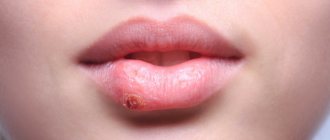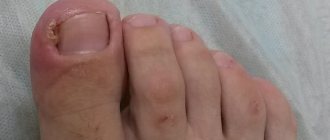Causes of vulvitis
Against the background of severe viral infections, disruptions in the gastrointestinal tract and immunity, even a wet swimsuit or cold stool can cause vulvitis.
The development of vulvitis is provoked by:
- vegetoneurosis;
- tight clothes;
- increased sweating;
- synthetic pads and underwear;
- poor hygiene during menstruation;
- injury to the mucous membrane and skin in the pubic area;
- taking heavy antibiotics or a course of radiation therapy;
- constant humidity in the area of the external genitalia;
- maceration of the vulvar mucosa with secretions from the cervical canal or vagina;
- metabolic and hormonal dysfunctions: diabetes mellitus, vitamin deficiency, ovarian hypofunction, allergic reactions, obesity.
The risk of developing an inflammatory process is significantly increased by delicate mucous membranes, folds, and accumulation of blood vessels and nerve endings near the surface of the epidermis. In rare cases, vulvitis is diagnosed against the background of diphtheria, tuberculosis, or immunodeficiency.
Vulvitis is caused by the following infections and fungi:
- chlamydia;
- gonococci;
- helminths;
- Trichomonas;
- streptococci;
- staphylococci;
- coli;
- yeast fungi.
The inflammatory process of the external genital organs (vulva) in gynecology is called vulvitis
Among the most common causes of vulvitis are sexually transmitted infections, constant stress, tuberculosis or E. coli and other microorganisms. The allergic factor also plays an important role. That is, vulvitis can be the result of an allergic reaction of the vulvar mucosa to a certain irritant: household chemicals, pads, wet and dry wipes, toilet paper, synthetic underwear, condom lubricant, vaginal suppositories, douching, etc.
It is characteristic that allergic vulvitis can occur not only in adult women, but also in children's girls.
Types of vulvitis
There are two types of the disease:
- primary vulvitis;
- secondary vulvitis.
If the cause of the development of the inflammatory process of the vulva is the organs of the reproductive and excretory system (bladder, tonsils, kidneys, vagina, uterus), secondary vulvitis is diagnosed. In this case, the main therapy should be aimed at the source of infection, and then at the treatment of the external genitalia. As a rule, secondary vulvitis occurs against the background of existing inflammation: cervicitis, endocervicitis, colpitis.
Primary vulvitis is common during the formation of the reproductive system, hormonal maturation, and postmenopause. This clinical picture of the disease is associated with the characteristics of the female reproductive system. In little girls with unformed local immunity, primary vulvitis often develops due to pinworms.
When the level of estrogen in women decreases (during menopause), atrophy and thinning of the vulvar mucosa occurs, the protective function decreases, and vaginal discharge decreases. Hormonal changes in the body can trigger the development of vulvitis.
In women of reproductive age with a healthy hormonal background, physiological microflora and Ph-secretion, primary vulvitis is unlikely; in rare cases, vulvovaginitis is diagnosed.
Inflammation of the labia in women, video
Gynecologist Irina Vladimirovna Garyaeva about vulvitis in women.
Source - KVD - dermatovenerological dispensary Sources:
- ROLE OF INFECTIONS IN THE GENESIS OF VULVA DISEASES. Reutskaya M.A., Kulinich S.I. // Siberian Medical Journal (Irkutsk). – 2010. – No. 6. – pp. 239-242.
- CLINICAL AND MORPHOLOGICAL PRINCIPLES OF TREATMENT OF CHRONIC VULVITIS. Kulinich S.I., Reutskaya M.A., Pokinchereda T.V., Ezhova I.V. // Acta Biomedica Scientifica. – 2013. – No. 5 (93). – P.42-48.
- Diseases of the cervix, vagina and vulva: Clinical lectures. Ed. V.N. Prilepskaya. // M.: MEDpress. - 1999. - P. 432.
- Recurrent vulvovaginal candidiasis: etiology, pathogenesis, treatment. Levonchuk E.A. // Med. news. - 2001. - No. 4. — P. 40-43.
- Dystrophic diseases of the vulva. Diseases of the cervix, vagina and vulva. Ed. V.N. Prilepskaya. // M.: MEDpress. - 1999. - pp. 326-336.
- https://simptom-lechenie.ru/en/vulvit-u-zhenshhin-i-devochek-simptomy-i-lechenie.html
- https://www.thenakedscientists.com/science-articles
- https://woman-centre.com/vlagalische-i-vulva/vulvit/vulvit-u-zhenshhin.html
- https://simptomer.ru/bolezni/zhenskie-zabolevaniya/864-vulvit-simptomy
Signs of vulvitis
In gynecology, a distinction is made between chronic and acute forms of the disease. The photo of a patient with vulvitis clearly shows hyperemia, redness and modified mucous membrane.
Signs of acute vulvitis:
- swelling of the clitoris;
- itching and burning of the vulva;
- redness of the labia;
- enlargement of sebaceous glands;
- the appearance of ulcers and erosions;
- painful urination;
- roughness of the labia minora;
- bloody or serous-purulent discharge;
- damage to the inguinal folds (in rare cases);
- blisters with fluid (herpetic vulvitis);
- enlarged lymph nodes in the groin, sometimes an increase in temperature may be recorded;
- curdled, yellow-green or white discharge of a watery nature (if the cause of vulvitis is E. coli, staphylococcus).
Manifestations of chronic vulvitis:
- swelling of the vulva;
- itching and discharge;
- epithelial defects;
- hyperemia on the vulva;
- redness of mucous membranes;
- hypertrophy of the sebaceous glands.
Vulvovaginitis: drugs
Local and oral agents are used for treatment.
Vaginal suppositories and creams (Gynex, Clotrimazole, Lomixin) are indicated as local ones. Doctors also prescribe a course of tablet antibiotics (Pancef, etc.). For candidal etiology, antifungal agents are prescribed: Nystatin, Fluconazole, Itraconazole, Metronidazole.
Upon completion of treatment, doctors recommend taking probiotics (Lactozhinal, etc.) to restore the microflora.
If the cause of the disease is worms, anthelmintic drugs are needed: Aldazole, Pirantel.
Consequences of vulvitis
The acute form of vulvitis in children is accompanied by nervous excitability and sleep disturbances. If diagnosis and treatment are not timely, the disease develops into a relapsing chronic form.
As a result of vulvitis suffered by a girl at an early age, genital deformities develop and fusion of the labia minora (synechia) occurs. Untreated chronic inflammation can subsequently cause anorgasmia, miscarriages, and infertility.
If you experience similar symptoms, consult your doctor
. It is easier to prevent a disease than to deal with the consequences.
Diagnosis of vulvitis
The diagnosis of vulvitis is made based on examination of the patient’s external genitalia. For an accurate diagnosis, the gynecologist uses a hand-held magnifying glass, conducts vaginal-abdominal and rectal examinations, takes a smear for cytology, and examines peripheral lymph nodes.
To identify the causes of the inflammatory process, additional diagnostics are required:
- Analysis of urine;
- vulvoscopy;
- HIV test, RW;
- general blood analysis;
- cultural sowing;
- bacterioscopy of smears;
- tests for helminths (feces or blood).
Treatment of vulvitis
Complex therapy for inflammation of the external genitalia includes:
- drug correction;
- intravaginal irrigation and baths;
- supportive therapy (homeopathy, hormones, macroelements, vitamins, immunostimulants).
During treatment, women are advised to refrain from sexual intercourse, going to the pool and the beach, and are prohibited from using vaginal tampons and panty liners. If a bacterial source of vulvitis is identified (candidiasis, tuberculosis, gonorrhea, chlamydia, trichomonas fungus), appropriate medications are prescribed (injections, tablets, suppositories, creams).
In little girls, in most cases, inflammation of the labia is provoked by opportunistic microflora. The photo of vulvitis in children shows redness not only in the area of the external genitalia, but also inflammation in the inguinal folds, on the thighs and buttocks. The gynecologist prescribes local antibiotics in the form of ointments and baths with anti-inflammatory herbs (chamomile, calendula, string, eucalyptus).
To relieve symptoms of acute vulvitis, the following therapeutic methods are used:
- Ural Federal District;
- hydrocortisone ointment;
- anti-inflammatory suppositories;
- baths with herbs and potassium permanganate;
- compresses with Furacilin, lead water, eucalyptus infusion;
- irrigation of the external genitalia with potassium permanganate, boric acid solution;
- the use of powders with streptocide, camphor, folliculin, zinc oxide, talc, anesthesin.
If vulvitis is allergic, antihistamines and dietary supplements are prescribed.
How to treat vulvitis in girls
Vulvitis in girls must be treated with special care. Treatment begins immediately after the examination, since the child suffers greatly from the symptoms of the disease. Treatment for children should be comprehensive (general and local). Special powders and sitz baths with a pale pink solution of potassium permanganate, antibiotics, anthelmintics and vitamins are recommended.
Vulvitis during pregnancy
During pregnancy, the body begins to produce hormones that promote growth, fetal formation and a favorable course of pregnancy. All endocrine glands of the body are completely rebuilt: reproductive, thyroid, adrenal glands, pituitary gland. At the same time, the adrenal glands sharply increase the production of glucocorticoids and mineralocorticoids, which suppress the mother’s immunity to preserve the fetus.
The most common causes of vulvitis in pregnant women are yeast, E. coli, staphylococci and streptococci. In the first and second trimesters of pregnancy, candidal vulvitis, hyperpigmentation and striae formation are often diagnosed. The gynecologist must select the optimal therapy for the pregnant woman and a set of supportive procedures to prevent relapses. Untreated vulvitis can lead to infection of the fetus during passage through the birth canal.
Folk remedies for treating vulvitis
It should be noted that herbal infusions, plant juice and any homeopathic medicines are not able to cure vulvitis, which is caused by gonorrhea, trichomonas fungus, tuberculosis, herpes, staphylococcus or chlamydia. Folk remedies help only with the non-infectious nature of the disease.
Proven anti-inflammatory and immunostimulating agents:
- Kalina. A tablespoon of dried inflorescences is poured into a glass of water and kept in a steam bath for 8-10 minutes. The strained decoction should be taken three times a day, one tablespoon at a time.
- Stinging nettle. Young nettle leaf juice is taken one teaspoon three times a day.
- St. John's wort. A tablespoon of dried collection is poured with a glass of boiling water and left for 40-50 minutes. The decoction is filtered and drunk 50 ml three times a day.
- Wintergreen round-leaved. The succulent leaves of the plant are doused with boiling water, crushed and applied to the vulva for 5-10 minutes. Such phytoapplications are good at relieving itching, burning and hyperemia of the mucous membrane.
- Lungwort. Freshly squeezed juice of the leaves of the plant is diluted 50/50 with water and applications are made to the vulva twice a day. Lungwort has anti-inflammatory and antiseptic effects.
Popular questions
I suspect inflammation and cysts.
The doctor prescribed IV thiosulfate, IM ceftriaxone, and Diclovit suppositories. I just didn’t explain, is it necessary to apply everything at the same time or what? Hello! Most often, this complex of treatment is carried out simultaneously, but it is better to check with your doctor.
Hello. My labia and clitoris are swollen, there is a burning sensation and a cheesy discharge with something in it, the color is unclear. What could it be and how to treat it? Before that I had inflammation and treatment, and after that it all started. Hello! This is how vulvovaginitis manifests itself. I recommend that you contact an obstetrician-gynecologist and conduct an examination to find out the cause of the inflammation. This will allow you to correctly prescribe therapy. At this stage, you can use Gynocomfort gel with tea tree oil, 1 dose once a day, which will limit the spread of inflammation and improve your well-being.
Hello! Severe itching on the labia, irritation. There is nothing to worry about in the vagina itself. What could it be?
Hello! This may result in an allergic reaction or inflammation. I recommend using Ginocomfort gel with mallow extract, applying it once a day to the discomfort zone for 7 days. If you do not notice relief, consult a doctor.
Good morning, I have vulvitis on my labia minora, I don’t know what to do or how to treat it.
Hello!
If inflammation occurs in the labia minora area, you can use Gynocomfort gel with tea tree oil. The gel is applied in a thin layer once a day for 1 week. If complaints persist, you should consult a specialist. For an accurate diagnosis, contact a specialist
Prevention of vulvitis
Girls should be taught to properly care for their genitals from birth. Regular washing with non-alkaline compounds, clean linen and proper hygiene of the child after using the toilet can prevent inflammatory and serious infectious diseases of the reproductive system.
The basis of prevention is compliance with three simple rules:
- underwear made from natural materials;
- healthy lifestyle;
- hygiene.
This article is posted for educational purposes only and does not constitute scientific material or professional medical advice.
Reviews
Author, 06/24/2016
Hello! The story is like this. Candidiasis, that is, thrush, has been tormenting me for a long time. Flucostat is effective for two days for a maximum of a week. I contacted doctors. The last doctor prescribed a diet and a long course of treatment. Apply clotrimazole externally for 21 days, Viferon suppositories, then a one-time application, five Revita tablets taken internally for a month (so that ascorbic acid restores the microflora). And in the end, two weeks after the end of treatment, the finish is complete again. Everyone stupidly advises using soda the old fashioned way, but I’m afraid of experiments. Who was in such a situation and won this byaku? Please share your experience.
Irina, 08/15/2016
Oh, how familiar this problem is to me, nothing helps. There are probably no medications that I haven’t tried. I took smears and culture tests 100 times. I did everything as prescribed by the doctor. After treatment with antifungal drugs, I took probiotics and put on suppositories. I also tried folk remedies. I donated blood. It seemed like the norm was the last time (albeit a year ago). I’ve been suffering from this infection for about 15 years. At first there were relapses once every six months, then after a month or two, now a week after the end of treatment. I don’t know what to do. I’ll go to the doctor again. But I don’t believe it anymore. All this time I did what they told me. How much money I spent, I’m generally silent. And I tried expensive medications and their analogues. They brought it to me from abroad. I constantly deal with this garbage. I don’t believe that anything will help. More like a cry from the heart. I finished another course of treatment a week ago. Here we go again...
Alena, 35 years old, September 20, 2016
I had thrush for about 9 years. I read medical articles about this, itraconazole helped me, but I took it for about a week at the same time as Terzhinan suppositories for 10 days, after that Vaginorm for 6 days along with ecofemin in tablets, and don’t expect to be cured in one month, further 3 months, fluconazole once a week, and do not stop repeating Vaginorm and Ecofemin after menstruation, and then depending on the situation, as soon as I feel that something is starting again, terzhinan suppositories and Ecofemin lactobacilli, constant monitoring, but for almost a year there have been no fungus in tests)!









